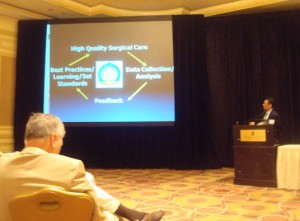
“Overcoming unconscious incompetence”--This is how one emergency medicine physician described his efforts to convince colleagues about the need for better education of resident trainees in the care of older adults. Many specialists--ER docs, surgeons, anesthesiologists, gynecologists, urologists, etc.--and those who train them believe they already take excellent care of all their patients. While some do, ample evidence points to the contrary. One in seven hospitalized Medicare patients are harmed in the course of their treatment, and almost one in five are re-hospitalized within 30 days. Confusion abounds about post-operative delirium, as my colleague describes here. Still, many specialists don’t yet see the need for more or better training in caring for older adults.
Awardees of the Geriatrics Education for Specialty Residents Program, a component of the Geriatrics for Specialists Initiative of the American Geriatrics Society, are helping physicians know what they don’t know about the unique needs of older patients. Through small grants they’ve developed curricula and educational resources to better prepare residents on topics such as polypharmacy (multiple, conflicting medications), atypical presentation of symptoms, and transitions of care for older adults. They came together at a conference in June 2011 to catalogue their educational tools and strategize on how to spread those resources into training programs across the country. (For a sample of products go here; a more complete collection will be available in September.)

Since 2001, about 90 residency programs have received grants ($40,000 over two years in the most recent cycles), producing over 164 educational products and reaching more than 3,000 residents. As models for the specialist-geriatrics collaboration required from the residency programs, Drs. Ronnie Rosenthal, a surgeon from Yale, and Myron Miller, a geriatrician from Johns Hopkins, lead the program and are working with awardees to spread their tools and reach even more trainees. The resident educator awardees are champions and leaders themselves, helping the broader Geriatrics for Specialists Initiative by increasing geriatrics expertise within their institutions and specialty societies. Their work fits within the American Geriatrics Society’s efforts to identify gaps in research, support aging-focused physician-scientist junior faculty, and work directly to influence specialty organizations.

The time is ripe for the educational tools and resources developed through the Geriatrics Education for Specialty Residents. By improving residency educational programs with tools such as those developed through the Geriatrics Education for Specialty Residents Program, not only will we have better specialty physicians in the long run, but older patients will immediately receive safer, higher quality care that will more likely contribute to the reductions in the growth of health care spending we desperately seek.
